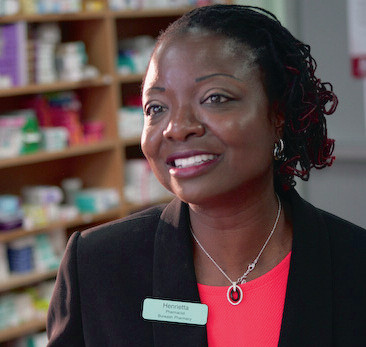'Now I can write to patients' records'
In Interviews
Follow this topic
Bookmark
Record learning outcomes
A pilot scheme in Brighton and Hove gives community pharmacists access to records following referral from local GP practices. P3 finds out more from Henrietta Adu
 Henrietta Adu is an ‘EPiC’ pharmacist. As well as being great at what she does, it also means that her pharmacy, Burwash Pharmacy in Hove, East Sussex, is involved in Brighton and Hove’s Extended Primary Integrated Care scheme. This is one of the 20 areas of the UK given funding from the Prime Minister’s Challenge Fund, in this case to set up an integrated care pilot scheme for one year.
Henrietta Adu is an ‘EPiC’ pharmacist. As well as being great at what she does, it also means that her pharmacy, Burwash Pharmacy in Hove, East Sussex, is involved in Brighton and Hove’s Extended Primary Integrated Care scheme. This is one of the 20 areas of the UK given funding from the Prime Minister’s Challenge Fund, in this case to set up an integrated care pilot scheme for one year.
The pharmacy services work stream of the project looks at how pharmacists can ‘safely do some of the things that GPs normally do’, what illnesses they can treat, and how they can let the GP know what they have done in by linking pharmacies to patient medical records, with the consent of the patient. Mrs Adu, an Avicenna member, describes the scheme as a triage system.
‘Patients phone their surgery and have three options for who they can speak to. That’s a telephone consultation with a doctor or a nurse, to book an appointment to come in and see a doctor or nurse or the option of a referral to a community-based pharmacist,’ she says.
Access to records
There is more to this than a standard pharmacyled minor ailments scheme, she says, because pharmacists can read and write to the patient’s record. ‘You have the patient’s background, and can see what tests have been done and the results. So, you’ve got the information needed to make a full conclusion. When you’ve finished you can then send a message to the GP.’
‘Patient consent is a priority and we undertake a dual consenting process. At the time of booking the appointment with the pharmacist, verbal consent is sought to ensure patients are happy to share their medical record with the community pharmacist who is assessing them that day. Consent is then required again from the patient when they attend the pharmacy to allow the pharmacist to enter the patient’s notes. Access is limited to the pharmacist with an authorised smartcard, ensuring that the appropriate governance is in place.’
The PGDs in the scheme cover 11 prescriptiononly medicines, which treat a broad range of common conditions such as bites, stings, urinary tract infections, nappy rash, thrush, eye infections, hayfever, asthma and the morning-after pill. The pharmacist appointments, usually booked for the afternoon, take 15 minutes, following referral from the GP surgery.
‘The GP indicates what the condition is and the person comes to us for a consultation,’ says Mrs Adu. ‘We then undertake a consultation, making sure they meet all the criteria of the PGD and then dispense the prescription.’ The system prompts for consent before starting the consultation. ‘And no one has refused’, she says.
Having access to the patient’s records is a clear advantage, she suggests. ‘The key areas that I look at in the patient record are their results – what people have been tested for and what the result was – and I have a look through their past medical history.’
Feedback
The number of patients seen varies, she says, with up to about 20 people coming to the pharmacy through the scheme in the busiest month. The pharmacy has been involved in the EPiC scheme since January, and the pilot finishes in October.
‘So far all the feedback has been really positive,’ she says. Patients haven’t experienced any inappropriate referrals, she says. Other benefits are that it can bring new people in to the pharmacy and it has helped in building up relationships with general practices. Should the scheme be rolled out more widely in the future?
‘Yes, I think so – though for a busy community pharmacy the remuneration for such a scheme would need to be at a locum pharmacist level. We will see what happens at the end of the project.’ She hopes that being involved in the scheme this year could also lead to other projects.
‘I think it could extend to other things. We have the patient here, so why can’t we do a blood pressure check, for example? One doctor’s surgery used me to help with their medication reviews when they wanted to catch up.’ Mrs Adu is currently training to be an independent prescriber at the University of Reading, which she hopes will add to roles that she could take on in the future.
‘It is very useful for patients to hear GPs say that “Henrietta has access to your records”, and knowing that the GPs feel that we can do this,’ she says.
The EPiC scheme
For more information about Brighton and Hove’s Extended Primary Integrated Care scheme (EPiC), see: epic-pmchallengefund.uk
